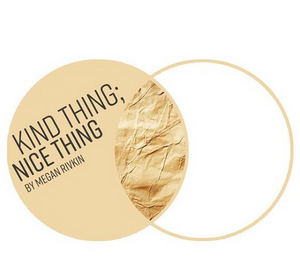Review: KIND THING; NICE THING at Homesick Play Project

If you aren't tuning in to the works by Homesick Play Project yet, you should certainly check them out. Following a dynamite premiere of M Sloth Levine's Nosferatu, The Vampyr with music by Alissa Voth, this week's Kind Thing; Nice Thing by Megan Rivkin presents a lot to digest. Interwoven with a waifish-ly allegorical riff on Andersen's The Little Mermaid as relayed to the unseen son, Ducky, we witness the realities of an extramarital affair.
My immediate response to this reading of the play, which had its premiere at Tufts University unfortunately canceled, is that I would love to see how it would change were the actors cast actually artists who use they/them pronouns in their lives. Though rarely alluded to in the script outside of stage directions, the three characters each use the same set of pronouns (they/them/theirs). In a way, I suppose there is something radical about the way this production chose to structure the gender politics-- which landed with the subtlety and fresh-face of an episode of Mad Men (not subtle at all)-- in that these characters normalized use of gender-neutral pronouns despite their inadvertent queerness. Non-binary people and others who use they/them pronouns have no responsibility to lead interesting lives, or to look, act, or dress any certain way. If that was the message this piece is trying to send, I would love to see them explore that idea more fully. If the message is that non-binary people can lead mundane lives, I want to feel that delivered unquestioningly.
However, I found the casting to effectively place this piece as a bland story we have seen a million times before. No matter the pronouns, is the monogamous, married life with a child the only reality we can explore in 2020? Max Klaver as Alex spoke with the low, raspy monotone that we are expected to fawn over in our fully-fleshed out (usually) male lead, and hearing intercut stage directions refer to Alex as 'they' did little to complicate, subvert, or challenge the trope of the masc-presenting individual relatably unfulfilled in their marriage. Isabel Fernandes as Bennett serves as the perfect femme foil, whining through the text in an overly-animated mania with an incessantly circling right hand. Again, references to the character as 'Ben' do little to challenge or comment upon the Betty-Draper-pastiche unfolding through Zoom. Completing the trio, Thomas Levy's Sam is the gentle-voiced, soft-spoken art student with whom Alex is romantically involved as Bennett sits at home perfecting their looks.
Arguably, there is nothing 'wrong' with this casting. A playwright intentionally leaves genders open to interpretation, and either Tufts University approached casting with, what I believe, was the most boring, simplistic approach available. What conversations could we have if all three of these characters were played by non-binary, gender non-confirming, or two spirit people who actually use they/them pronouns? (Full disclosure, I do not know these actors' genders, but none of them use they/them pronouns). Conversely, if the point of the script was to leave genders open to any casting, why deliberately choose to explore a cliche gender dynamic? He/him leaves she/her for he/him.
In all fairness, this was an early reading of a new work, so understandably, there are questions I have that the playwright might well be aware of and actively addressing. Rivkin has loaded the script with smart commentary and well-developed philosophical ponderings, but they need to be consolidated or communicated differently. As it stands, each vignette sets up a pairing in which one character is incredibly socially conscious and emotionally intelligent while the other has to serve as a blank, clueless sounding board for their partner's internal quandaries. The constant imbalance of (for lack of a better word) intelligence limits any visible character arcs or progress and gives an imbalanced sense of personality in an ephemeral universe of interchangeable voices. Mirroring the ways I think this production could have leaned further into its queerness, I think the script could wander further into its ethereal aspirations. The piece was advertised as being "told through a series of bedtime stories and dreamlike vignettes", but was essentially a series of scenes of quasi-realism cut and pasted into a (seemingly) random sequence. Much like my qualms with Tanya Barfield's Bright Half Life at Actors' Shakespeare Project earlier this season, I do not think the form itself is interesting enough to justify the bland cliches in the content.
The play made me think, and, as virtual readings go, is a glitch-free 90 minutes that may also make you think. There is a clever through-line with the use of words like 'bad', 'nice', and 'good' that give insight to characters' internal turmoils. As always, my email is wide open if you watch it and would like to share your thoughts!
Watch the archival of Kind Thing; Nice Thing here.
Edits: An earlier version of this review was unclear on who cast the show.
Reader Reviews
Videos

